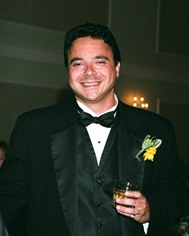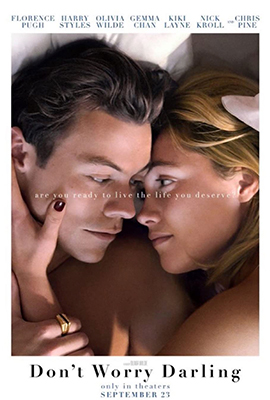“Don’t Worry Darling” is a psychological thriller that gets psychotic in its logic but thrills with its actors and atmosphere.
Florence Pugh plays Alice, a ‘50s housewife whose husband Jack (Harry Styles) works as a technical engineer on the Victory Project. They live in a suburban cul-de-sac adjacent to a desert that houses the project’s headquarters. Every morning at the same time, the wives collectively stand in their driveways, waving goodbye to their husbands as they speed off to work- the routine is creepily choreographed.
The wives know nothing about their husband’s work; they cook, clean their homes and lounge by the pool awaiting their husbands’ return. The weather is always sunny and everything, from their clothes to their cars, is pristine. Reminiscent of “The Right Stuff’s” Apollo astronauts’ wives living on base, the community seems straight out of Look magazine.
The leader of the Victory Project is Frank (Chris Pine). He occasionally gathers his employees and their wives to rally them on the righteous work they’re doing in the desert (though never divulging what it is) and everyone’s role to that end- basically, the wives make their husbands’ happy so the men can fulfill the mission. Stepfordesque? Yes, but it’s the ‘50s and Frank runs the show: his meetings are for mantras and monitoring.
In addition to wives not knowing what the Victory Project is, they’re not allowed in the desert housing the headquarters. One wife does go and returns muttering that something’s not right. Naturally, she and her husband don’t remain in the community long. Alice sees a plane go down in the desert soon after and runs into the desert to help. She winds up at Victory Project headquarters and touches a glass wall only to be touched in return with recurring mind-bending visions.
What are Alice’s visions? They include nightmares of Busby Berkeley dancing girls whose circled legs configure to the iris of Frank’s eye to daydreams of the desert-roaming wife headbutting mirrors from the other side of the reflection. What’s it all mean? For Alice, she’s in a world of Frank’s making and Frank’s up to something not good.
Frank anoints Jack to the Project’s inner circle at a gala party that can best be described as a typical Saturday night had the Nazis won the war. Jack fervently dances in celebration and hosts a dinner party where Frank makes a rare appearance. Catching Alice in private, Frank informs her he’s aware of her knowledge (making Jack part of his inner circle denying her one more ally should she challenge him). With the gauntlet thrown, will Alice conform or combat Frank and the mysterious mission he’s undertaken?
It’s here that “Darling” begins to run off the rails with a sci-fi tie-in to explain the strange goings-on. In fact, the sci-fi angle breeds more ambiguity: the Victory Project serving as a Macguffin that isn’t explained, only existing to trigger Alice’s actions. Will the ambiguity frustrate audiences? Probably, but to explain the project would probably cheapen its power or limit what audiences perceive it to be. While it’s probably what director Olivia Wilde and writer Katie Silberman intended, something more definitive would have stamped more stability on the story.
Luckily, what keeps you interested in “Darling” outweighs the obscure. Pugh, Styles and Pine all excel in their respective roles and the look of the movie is amazing- if “Darling” should get any awards consideration, the production designers nail the ‘50s. From sleeveless dresses and skinny ties to mint green automobiles and manicured lawns, the Victory Project community is perfectly composed.
While its conclusion may leave some wanting more clarity, “Don’t Worry Darling” is an intentionally well-crafted fever dream designed to make you feel fuzzy.

